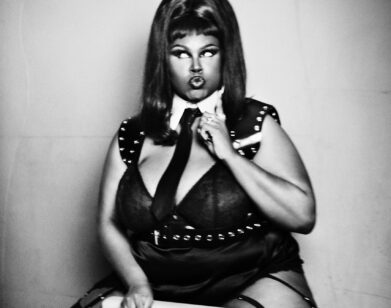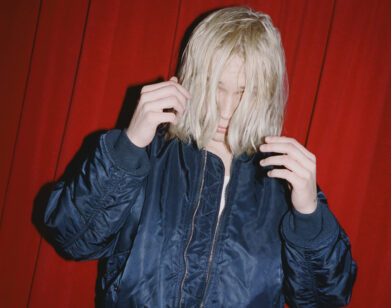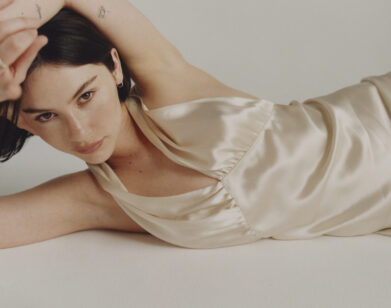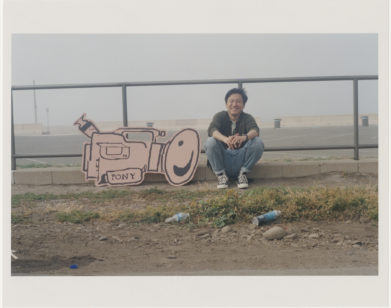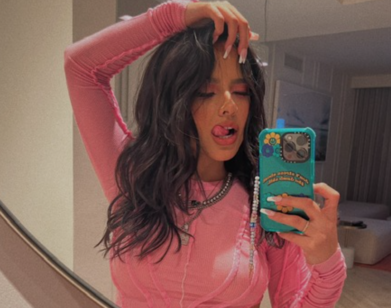IN CONVERSATION
Arooj Aftab Tells Puja Patel How Winning the Grammy Sparked Her Reinvention
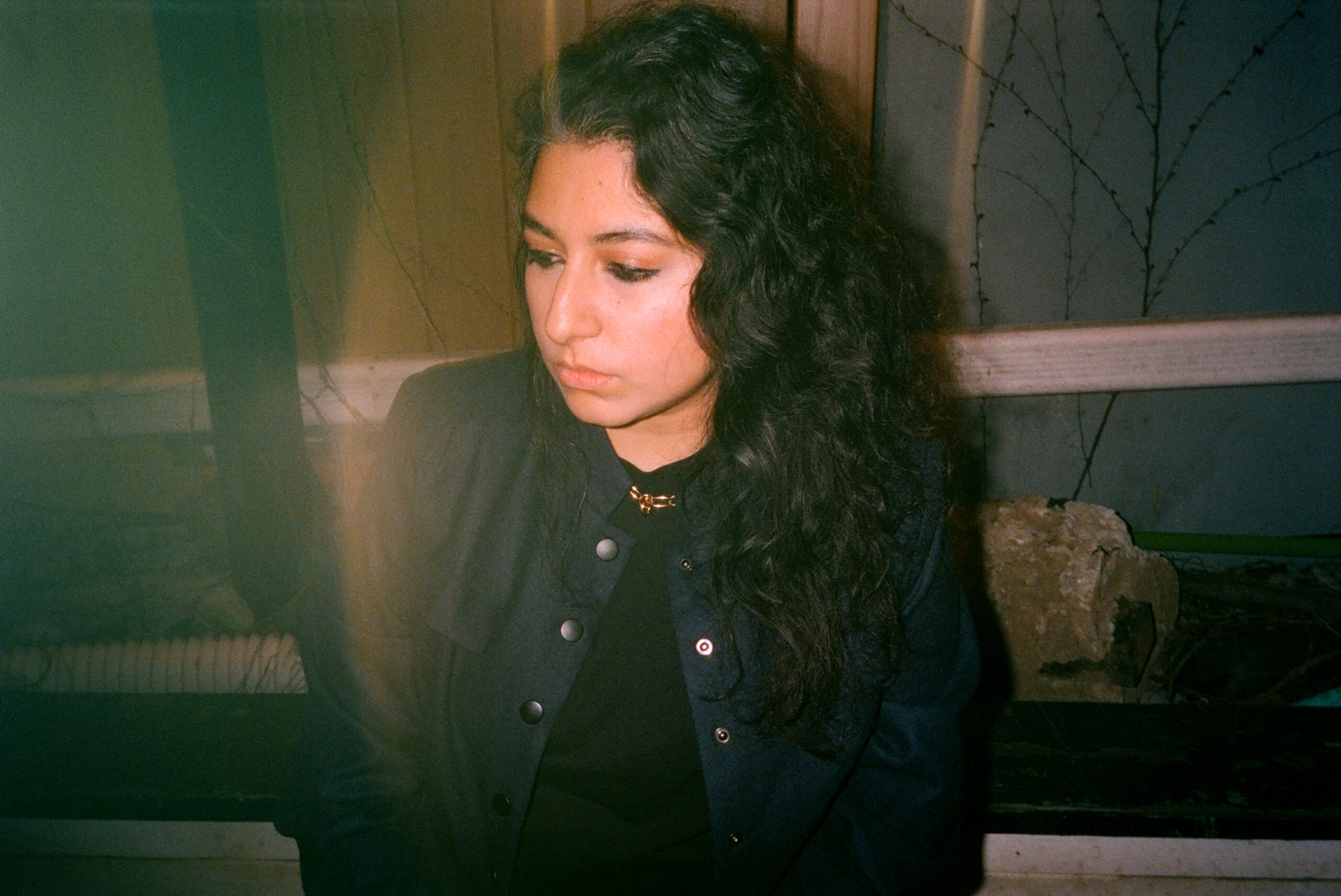
Arooj Aftab, photographed by Luisa Opalesky.
When Arooj Aftab became the first Pakistani person to win a Grammy, she celebrated Vegas-style: champagne and sparklers. But in the aftermath of her breakout, the reductive nature of the music industry and the scourge of its obsession with genre followed her. “I don’t want to become the person who is responsible for carrying on this idea of tradition,” the singer-songwriter told former Pitchfork editor-in-chief Puja Patel, who was in attendance when Aftab won Best Global Music Performance in 2022. Aftab knew she had to do something “big” with her next project, something that showed her personal evolution. In her latest album, Night Reign, which dropped last week, she does just that. Her music pushes back against the notion of what a South Asian artist should be and instead lingers on the fleeting moments that shape her musical freedom. Before setting out on her European tour, Aftab made a pit stop at Patel’s home to grab a mango and talk about how her life has changed since that Grammy, her love of late nights, and what she has in common with Drake.—EMMA STOUT
———
AROOJ AFTAB: I’m really glad you’re doing this, because it would be so awkward if it was just some asshole, you know?
PUJA PATEL: Well, try me out and let’s see.
AFTAB: You have such an adult place. Look at your bowl of oranges.
PATEL: You don’t have a bowl of oranges?
AFTAB: I have a bowl that has one apple that’s going bad.
PATEL: I always have a bowl of oranges in my house. I also always have almonds and some kind of fruit in the fridge. This reminds me, I have a treat for us.
AFTAB: What is it?
PATEL: I got it from Jackson Heights. It’s a kesar mango!
AFTAB: Is it ready? You might need to leave it on the counter for a bit. Look at me trying to be a mango expert over here.
PATEL: Well, I got two crates.
AFTAB: So you’ve tasted them.
PATEL: I’ve tasted them. It’s not like, dripping from the pit yet. I feel like I haven’t seen you one on one in a long time!
AFTAB: That’s true. It’s usually stumbling in the night in the midst of 400 people. We hung out at the Grammys, which was so many people, and at my video release party which was also so many people.
PATEL: Were the Grammys in Las Vegas our first real hang?
AFTAB: Yes. With the three-hundred girls and all the bachelorette parties.
PATEL: I remember that DJ Marshmello was presiding over a pool and there were champagne bottles with sparklers coming out of them.
AFTAB: And then there were these women, and one had “B” written on them, and then it was like, “E-S-T” to spell out Best New Artist. There was that whole line of them dancing. They came in on that fake boat.
PATEL: This is when you were nominated for “Best New Artist,” and it was the Best New Artist Grammys party.
AFTAB: It had to be that year for me, right? Ugh. The Vegas year.
PATEL: This year was much better. Weirder for me, but more fun.
AFTAB: I was less thinking about outcomes and just trying to have fun, which was good. We threw a party! We hung out with Moses and Amaarae and Zsela and Rostam and Empress Of…
PATEL: The Dare.
AFTAB: Who’s The Dare?
PATEL: He’s a musician and a DJ/producer who’s part of this [New York] downtown scene. He was the guy wearing the button down with Rostam. Nice guy.
AFTAB: I’m just now remembering that the Mexican contingent came. Natalia and Silvana Estrada. It was a good crew.
PATEL: Lorely walked in and saw the kids were going too hard and so she and Affan left. I think the last time you and I really got to hang for real was at our favorite bar down the street, and you showed me your album cover for Night Reign. You had just gotten back from Brazil and were all glowy and relaxed.
AFTAB: Oh my god, you’re taking me back. I was actually just looking at my computer and was cleaning up my files and was like, “What are these random .mov files?” I opened them and they’re all from my iPhone and the POV is me riding an ATV and it’s raining and muddy. It made me want to be there again.
PATEL: I feel like you’ve been making music and touring music nonstop for literally five years.
AFTAB: Yeah, I’m like Drake. [laughs] He’s like “I’m going to take a break! I haven’t taken a break in six years! I have stomach issues.” And I’m like same, Drake! [Laughs] But when do we ever stop working? So we decided to do this photoshoot on the beach, but I wasn’t sure if it was going to look cheesy or what. Like, here’s one more beach photoshoot with palm trees, fucking great.
PATEL: Except you’re not in a bikini eating a hamburger or staring off into the distance.
AFTAB: Yeah and it was quite a trek. It’s a 9 hour flight to Sao Paolo, and then another three hour flight, and then a three hour drive. It’s a really tiny town, it hasn’t been discovered by capitalism yet. So there’s no cocaine or techno and the douchebags haven’t showed up.
PATEL: The dream. Were you working on music there?
AFTAB: The album was kind of done in the fall of last year. I somehow recorded between touring with Love In Exile.
PATEL: Where did this idea of writing an album about the night come from?
AFTAB: I love the night. I stopped having a day job when Vulture Prince blew up and they just sent me out on the road. I was making the tour happen, and everything is centered on the night—you’re on the road, you’re in a different hotel room every night, playing to a different audience, meeting people, trying to sleep, and you’re also juiced after the shows. During the day you’re schlepping through the airports and trying to run to the next thing. I wanted to put something out that came from such a still place. It came from the labor of going to your 9 to 5 and then spending all your other time putting music together bit by bit, playing it, being in it, and being free.
PATEL: Have you always been a night person? I think of you as one. This is the earliest I’ve seen you in person besides that Vegas pool party, which happened at the brightest hour of day possible.
AFTAB: I thought I was a normal, balanced person, and that I just liked night because I was in my twenties. I was functional during the day, I had a job, so I thought I was fine. But if you take away having to work for the man and just become your absolute artistic whole self, it’s all night time stuff. And it’s great.
PATEL: I think of myself as an early morning person.
AFTAB: What time do you wake up?
PATEL: I wake up with the sun.
AFTAB: What do you mean?! Five AM?
PATEL: Most of the time I wake up with the sun, I’m not kidding!
AFTAB: That’s really crazy. And then what do you do? I’m so curious!
PATEL: I read, listen to music. Before I used to only be able to listen to new music in peace very early in the morning.
AFTAB: Like you look at pages? Or words.
PATEL: What do you mean? That’s how reading works.
AFTAB: These days people say they read but they’re listening to audiobooks.
PATEL: I don’t listen to audiobooks, I don’t listen to podcasts very often. You have to remember that I listen to so much new music.
AFTAB: That’s good! That’s your job!
PATEL: Well, not anymore. [Laughs] But I feel like I can only be fully creative for my private self and write fully honestly between the hours of 10pm and 6am.
AFTAB: It’s the time that everything you thought of and did you can remember and decompress it. I don’t know if there’s such an active thing happening at night, it’s just the processing and formatting of what we’ve done in our lives. When I write a song start to finish at night, it’s me processing something that happened a few nights ago.
PATEL: It’s when the world is quiet. It’s when the layers between us and space and time become thinner.
AFTAB: You’re not able to see everything so clearly otherwise. You have a bit of a blanket, you have a bit of cover of shadows.
PATEL: I remember when you were talking about this music after you had written a lot of it, maybe after it was done, and you were saying to me that it was “different.” And that you were nervous, or curious, about what people would think of it because you were being purposeful about pushing past what assumptions were about you. What did you mean by that?
AFTAB: I don’t know if it happened intentionally or organically but, of course, in the back of my head I knew it had to be different. It had to be representative of what happens to an artist two years after things have changed for them in a big way. I don’t even know if you want to call it “success.” Whatever it was, my story and journey changed in a big way after Vulture Prince. And so did my emotional and mental being, and so did the world, after Covid. I knew that one way or another the new music would encompass that stuff. Or at least I was hoping so. Also it was really fun, and also iconic, to make something like Vulture Prince that was able to bridge this gap that existed. It was like South Asian music rooted in a South Asian tradition was never part of the larger contemporary conversation. That’s for many reasons, but one of them was that that music wasn’t written in a certain way and I had been chasing that sound and trying to find the real crossover, and not just like a saxophone solo over tabla. But of course we needed that, we needed all of it to get where we are now. But I was pushing so hard for years, I was obsessed with the fact that there was a sound that hadn’t been done yet, and I needed to find it. So I had been trying to do it for all these years alongside my day job,trying to find the thing that would really cross our music over, and that happened. And then doors opened, and then they were like “You’re the best new artist…. We think.”
PATEL: We think.
AFTAB: And everybody from Obama to who-the-fuck-ever was like, “I see myself in this music. I don’t care if it’s in a different language.” That’s huge, right? Of course, there was a lot of homage, there were a lot of people describing it as an ancient reinvention, blah blah blah. I was like, okay, with Vulture Prince we did all that, but I really want to move on from that. I don’t want to become the person who is held responsible for carrying on this idea of a tradition.
PATEL: You didn’t want to become a representative of a strict idea of South Asian musical traditions.
AFTAB: Because so many people were like, “She’s a ghazal singer,” or “What’s a ghazal singer?”. People would earnestly be like, “Can you tell us about these secret ancient texts that you’re singing about in your traditional music?” I was like, “Oh my god. I’m singing about nothing! Don’t ask me about ghazals! You’ve all been bamboozled!” Everyone was telling me about how meditative it was.
PATEL: I really understand being pigeonholed into a very strong opinion of who you are by this othered gaze. One of the most beautiful things about your music for me, the part that does pull from ghazals or qawwali that other people might be trying to pin down, is this idea of fluidity. It doesn’t have to be so directly angled through the lens of tradition or identity.
AFTAB: Yeah, though I never want to dismiss that or say that’s not who I am, or that’s not where I’m from. I feel like I was born from inside a qawwali.
PATEL: Yeah, and you see some of the same things in jazz or other forms.
AFTAB: You’re right. Every artist should be allowed to grow, to express their unique way of viewing the world and express it through music, and people should leave us the fuck alone. [Laughs] Or, rather, they should not be like, “Oh, well, you’re this thing.” It’s like… Okay? Want to write me a handbook of how to be? I’ll try to follow it. [Laughs.] When I was making the production choices for the new single, I told the mix engineer Josh just to put in T-Pain levels of autotune on the vocals. They’re beautiful. It’s not like I’m not in tune, it’s not something that we used to correct the pitches of the recording, right? Like… duh, that’s not what we’re doing. But it is something that I’ve always been drawn to as a fan of Kendrick and Kid Cudi and T-Pain and Kanye. These guys innovated the way in which you present your vocals with all these other tools and they made it really cool, and kind of mind blowing. I’ve always been like, is there ever going to be a moment where this fits in my music? Or am I just a fan of that?
PATEL: It’s so interesting to hear you say that because rap obviously has a long history of sampling and taking from South Asian music too. The “Indian flute” alone! Can I ask about singing and writing in English and Urdu at once?
AFTAB: I’ve always sung in English, some of my favorite musicians are Ella Fitzgerald and Billie Holiday and Abby Lincoln. I studied jazz singing, and so it’s been a part of my repertoire for a long time. I’m so deeply bilingual. But it goes back to how I had been chasing this thing I wanted to make, so I put the English stuff away for a while. Now that that’s done, I’m like, “Let me investigate this world that has been on the backburner.”
PATEL: It’s so funny to know you in person. Your personality is so different from how your music makes me feel, if that makes sense. The way your music brings in older generations while feeling very contemporary, it brings me a lot of comfort. It feels like home because it reminds me of listening to Lata Mangeshkar or Asha Bhosle at home with my mom. But I also know that, as a friend, you’re a complete goofball. You’re never not cracking jokes.
AFTAB: Yeah! [Laughs.] Sometimes we start the concert and then we do the first song, and I start talking and everybody is like, “Whoa, she’s not the Sufi goddess that we came to see. She’s just swinging red wine and saying fuck on the mic.”
PATEL: Let’s talk about the music video for “Raat Ki Rani.” It’s your first one and Tessa Thompson directed it, and it was Tessa’s first time directing anything. How did that happen?
AFTAB: I’ve been a fan of hers forever. She came to one of the shows in London and we met and I became even more obsessed with her because she’s just so nice and genuine. To be that way and also be such a big deal and such a good actor, it’s so rare to see that. And so I was thinking about the music video. I hate music videos, that’s why I didn’t have one before this. I think they’re really lame and they cost a lot and nobody watches them. It’s not like we have MTV on.
PATEL: Music videos are one of the most watched things on YouTube!
AFTAB: Well, the statistics from the people who count the numbers, the internet numbers, say that music videos don’t drive sales or song streams. Anyway, so, the music video. I asked Tessa to be in it, and she was like, “Let me direct it.” And my friend Kishori Rajan works with Tessa on Viva Maude, which is this extremely cool production company wanting to uplift unique stories. I was like, “Well, you guys are motherfucking Hollywood as fuck, but will you make my music video? And can Tessa be in it?” Kishori and Tessa and their guys wrote the story. They told me what it was and I was like, that’s awesome. It’s framed like a perfume commercial. So it’s really stylish and sexual, because perfume commercials are just so extra anyway. But also it’s beautiful and subdued. It never became corny.
PATEL: The video shows this intense yearning between two brown women, and “Raat Ki Rani” translated is “Queen of the Night.” The semantics of that phrase in Hindi and Urdu are interesting. Tell me how you named that song, or where it came from.
AFTAB: There’s actually a flower called “Raat Ki Rani,” and it’s from the Jasmine family and is a favorite fragrance of mine. And they didn’t just call it Jasmine, they just actually gave it this really beautiful descriptive sentence of a name. I thought I was gonna name the album Queen of the Night, but that felt like there was too much of a chance of people making it about me as a protagonist.
PATEL: I was thinking more like “lady of the night”—the sparkle in the eye, mysterious woman. Maybe a courtesan.
AFTAB: Just a really alluring person. I love telling stories in songs that are the side kind of story. The ones we don’t always talk about and it’s not always written about as the great love stories of history. It’s that little moment I’m after.
PATEL: It’s a significant and rare thing to see on screen, especially with a song from a Pakistani artist. Have you heard from anyone about it?
AFTAB: People are really happy, across the board. Even older people. Because it is beautiful and relatable. Love is beautiful and it’s big and it shows up in many ways. Also being honest without making it like a big thing is a thing for me. I hate being pigeonholed. I hate being one thing. Artists are so many things, right? We should be allowed to make art that is also telling our truth without the industry just making it about that.
PATEL: Yeah, absolutely. Is there anything else you want to talk about?
AFTAB: No, I think that was so good. Anything else? Nothing.
PATEL: Should we eat this mango?
AFTAB: Mhmm.

